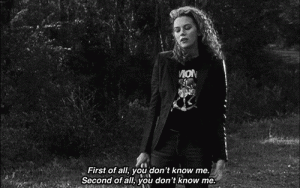AN INTRODUCTION : THE BEGINNING
“First of all, you don’t know me. Second of all, you don’t know me.”
And fortunately for all of you, this is your chance to take a peek inside my mind and learn the greatest of idiosyncrasies.. or ambitions. Hello avid readers! As you can already presume, I am absolutely terrible at introductions and not eloquent whatsoever, hence my opening quote taken from the tv series, One Tree Hill. But hey, in this first paragraph, you gathered that I love One Tree Hill so this isn’t a lousy start.
My name is Kristen Ylo and you are more than welcome to address me by my last name, “Ylo” or by [ky-lo] if you don’t know how to pronounce it or want to confuse me with our classmate, my namesake, Kristen Lew. Apart from that key detail (or is it?), I’m a five foot asian girl trying to make a positive impact as well as find a place on this ever-so terrifying sphere.
Anyway, speaking for myself, the transition from high school to university has been quite spine-chilling, so to say the least. As an Arts student, it has become obvious that I am required to read… a lot. And in the midst of all the text needed to be synthesized and reread in order to be understood, thinking and questioning like a scholar is also “highly-recommended.” In all honesty, I still force myself to believe I read the Magic Tree House series just yesterday. The jump from dissecting Shakespeare’s works to comprehending scholarly writing is intimidating and attempting to read, write and think as a scholar would will be an ultimate challenge; how I will manage is a complete mystery and I will question myself and my abilities until the day I graduate (hopefully).
Recently, on top of my textbooks, I was required to read Farhat Shahzad’s article on “The Role of Interpretative Communities in Remembering and Learning.” In her unique scholarly style, she informs readers that as humans, our knowledge of the world is shaped by the people we surround ourselves with; using the term “interpretative communities” to describe our everyday life influences.
In my ASTU class, we discussed this concept in greater detail and my professor wanted us to speak about what we felt were our own “interpretative communities”. Being in the “Global Citizens” CAP stream, my classmates related their answers to their knowledge on Iran – our example topic as I recall. They explained how previous History classes in for example, high school, shaped their understandings of the current events in that country. While they were discussing, my mind was off somewhere else thinking about this theme in a local aspect rather than a global one.
Three weeks into this new world also known as university, I have found that I’m greatly interested in the study of Sociology, and how in a way, it goes hand in hand with Psychology – the study of society integrated with the study of why people behave, think, and such. I was combining these interdisciplinary subjects with the initial understanding that “interpretative communities” don’t restrict themselves to shaping the individual, but also play a role in acceptance – kind of drifting away from the main definition, but these are my thoughts, right?
I value the concept of acceptance down to the core. I never want anyone to feel excluded or forgotten and when I do see someone struggle, I have a strong urge to help because I have been in that position several times before. For those of you who haven’t noticed yet, I carry with me a physical disability, a weak version of right-side hemiparesis. In my condition, my right side of the body is weaker than my left, and in my case, I have difficulty with fine motor skills. A part of me has always felt that because my left side of my brain is somewhat damaged, I partially struggle with comprehending English and organizing my thoughts well on paper – so if my post doesn’t seem consistent, I apologize in advance, I’m working on improving – however, it’s not a main issue and this is besides the point I’m trying to reach.
In class I was wondering, if somehow by introducing our backgrounds and cultures and deepest secrets, we might be able to connect larger themes and ideas even more, as a community. By understanding each other, we would not only get different perspectives of the world, but we would also find clarity in respecting and including. The way I see interpretative communities work, I see a friendly collaboration. It is not restrained to familiar relationships, but I believe this openness can be applied to anyone. Scholar to scholar, researcher to researcher, between any two or more strangers attempting to reach a common ground – if that makes any sense. That may not be the case in say, Debate Class, or more specifically, Political Science as different beliefs get insulted and people get offended, but maybe one can find a way around it.
This also brings me to other questions that may or may not seem relevant to my entire post.. what role does Global Citizenship play if interpretative communities are restricted to the people one associates themselves with? Isn’t the purpose of being “global” to open up one’s self to strangers and get to learn the world a little better?
Now you sort of know me,
KYLO
